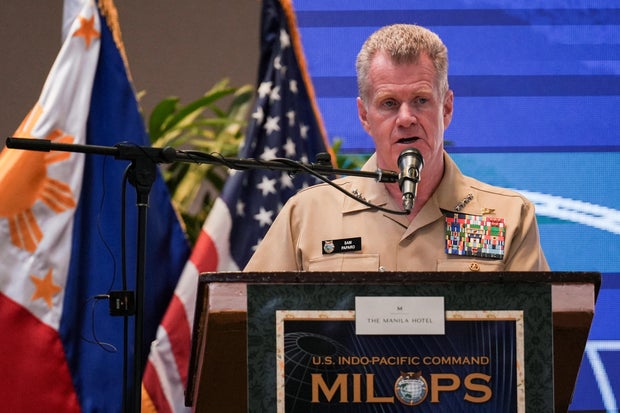The head of all U.S. forces in the Indo-Pacific spoke to a Chinese counterpart for the first time in years, according to a statement from the U.S. Indo-Pacific Command.
The video call between the head of U.S. Indo-Pacific command Admiral Samuel Paparo and Gen. Wu Yanan, the commander of the People’s Liberation Army’s Southern Theater Command, on Monday was the first call between leaders in that position for several years.
Paparo, according to the readout, spoke of how the importance of communication “between senior leaders serve to clarify intent and reduce the risk of misperception or miscalculation.”
Paparo only took over as commander of the U.S. Indo-Pacific Command in May 2024, but his predecessor Admiral John Aquilino has said he tried for three years to get a meeting with his counterpart so that the two militaries could work to avoid any miscalculations in the region.
Lisa Marie David / REUTERS
Military-to-military communications broke down significantly between the U.S. and China after Nancy Pelosi, then the House Speaker, visited to Taiwan in August 2022 and continued through the Chinese spy balloon incident in February 2023, when Defense Secretary Lloyd Austin tried to reach his Chinese counterpart over the phone but couldn’t get him on the line.
Resuming military to military communications was a key goal President Biden and President Xi Jinping agreed to work toward following their November 2023 summit in San Francisco.
Since then, Austin has spoken over the phone and met in person with his Chinese counterpart, and the top U.S. military officer Chairman of the Joint Chiefs of Staff Gen. C.Q. Brown has spoken to his counterpart.
But the concern over miscalculation stems from activities in the Indo-Pacific. In the call Monday, according to the readout, Paparo said there should be more discussions in the future between the two leaders to “clarify intent and reduce the risk of misperception or miscalculation.”
He also called out the Chinese military for “several unsafe interactions with U.S. allies” and asked China to abide by international law and to reconsider its “dangerous, coercive, and potentially escalatory tactics in the South China Sea and beyond.”
There have recently been several instances between the Philippines and China in the South China sea when Chinese ships fired water cannons at Philippine vessels or collided with them.
The State Department said in a statement at the end of August that multiple times throughout the month, China has “aggressively disrupted lawful Philippine aerial and maritime operations in the South China Sea, including at Sabina Shoal.” The State Department said the U.S. “reiterates its call” for China to “comport its claims and actions with international law and to desist from dangerous and destabilizing conduct.”
